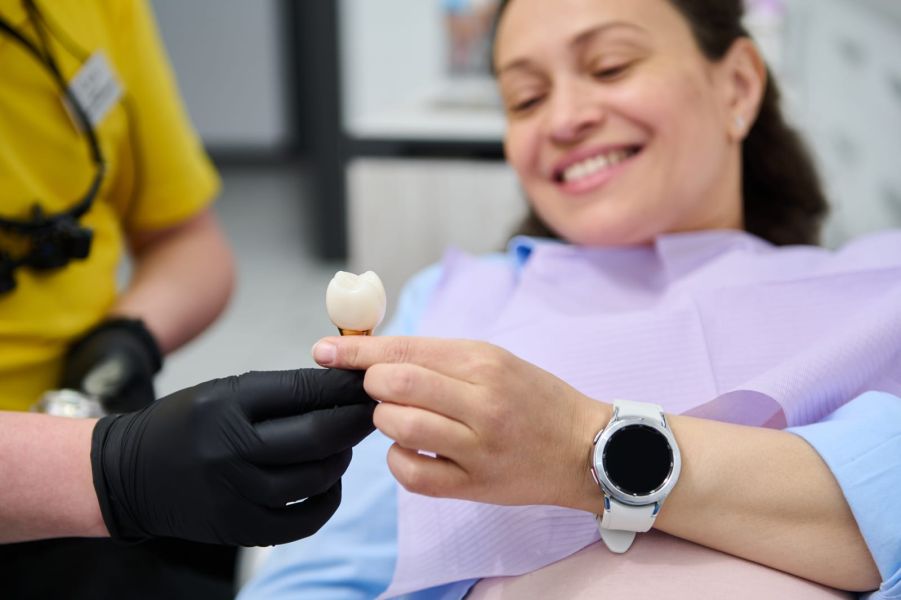In dentistry today, there are many ways to restore teeth. How do you sort through the abundance of offerings? In this article, we will tell you what types of dentures there are and what they hold, as well as which dentures are best for you. You’ll be able to navigate this issue and feel free to discuss your denture options with your dentist.
First, in this article, we’ll deal with the simpler option for restoring teeth – removable structures. They are easy to remove and are the most inexpensive option. A more complex and reliable method of restoration is implant-supported removable prosthetics, which can only be removed by a doctor. Conditional removable prosthetics are indicated in case of complete absence of teeth. If not all teeth are lost, fixed implant-supported prosthetics are suitable. They feel like your own teeth. This is the highest degree of comfort.
Removable dentures and their types
What are the different types of removable dentures? First of all, removable dentures differ in the material from which they can be made. There are two common options:
- Hard acrylic
- Soft nylon

Each of these options has its pros and cons. Nylon designs are very aesthetically pleasing due to their translucency. They are elastic and bend easily, so they can’t break. Light prosthesis is practically not felt in the mouth, it is easy enough to get used to it. Such constructions are suitable for partial absence of teeth.
Acrylic dentures are stiffer: the structure is stably fixed and chewing food with it is more comfortable. These dentures are suitable for both partially and completely missing teeth
How are removable dentures attached? If we are talking about a completely removable version in the case of complete absence of teeth, the structure is fixed by the so-called suction method. The denture can be removed at any time. Many people worry that such “teeth” can fall down while eating or talking. And these concerns are fair. Indeed, in terms of fastening removable dentures are quite unreliable.
A separate category is conditionally removable prostheses, namely implant-supported structures. Only a doctor can remove such a design. Prosthetics on implants are carried out with the help of special locks. In this case, it is absolutely clear which dentures are better: the implant-supported design is securely fixed and will not move anywhere.
This is an intermediate option between removable and fixed prosthetics. The doctor usually recommends this design if you need to restore the entire tooth row as a more comfortable alternative to a full removable denture.
Another intermediate option for prosthetics is braces. They are called so because their base consists of a “bunion” – a metal arch.
There are several attachment options for braces:
- Clampers – tightly encircle the supporting teeth, and due to this the structure is held in the oral cavity
- Micro-locks – one part of the lock remains on the denture and the other part is embedded in the metal crown on the supporting tooth.
- Telescopic – part of the bracket is placed on the supporting teeth like a crown.

The clasp denture has one special feature: it can be used to restore not only adjacent teeth, but also teeth that are far away from each other. Due to the presence of a thin arch, the denture covers a small amount of oral mucosa, and it is easy to get used to it. It does not alter the taste of food and evenly distributes the load between the existing teeth. Which type of denture will fit better on my teeth? Micro-locked dentures are the strongest. Like the telescopic, it is classified as removable. And with clasps – to conventional removable, it can be removed at home. The price is calculated individually, depending on the size of the denture.
Fixed dentures and their types
Fixed prosthetics is shown in case of partial tooth destruction, when there are still its roots, and in case of complete loss. In the first case, a crown is placed on the base of the destroyed tooth. In the second case, a fixed crown is attached to an implant.
The most common question when restoring teeth with a crown or “bridge”: what kind of material are prostheses? The answer depends on what your expectations are for your dentures.
- All-ceramic crowns. The most aesthetic option – ceramics is no different from real enamel: translucency and natural shine, and even mechanical characteristics – resistance to erasure and to staining – all this is similar to enamel and ceramics.
- Zirconium dioxide crowns. This white-colored material belongs to the class of ultra-strong and practically does not yield to the aesthetics of solid ceramics. For greater similarity, zirconium dioxide is painted in the tone of enamel or covered with a layer of ceramic of the same color.
- Metal Ceramics. A crown with a metal base and a ceramic coating is more suitable for restoring chewing teeth. It is strong enough, perfectly withstands the daily stresses of chewing food, but inferior to the previous two options in terms of aesthetics

The big plus of metal-free designs is that they are suitable for absolutely everyone. These are hypoallergenic materials. Convenient and sometimes the only possible solution for allergy sufferers.
Which dentures to choose
Which dentures are better? The most preferable option for both partial and full dentures is implant-supported dentures. Moreover, 4 implants are enough to restore the entire dentition.
Why is this option better?
- The construction on implants feels like your own teeth – it is comfortable to chew and talk.
- The implant distributes the load evenly – the bone retains its volume and the neighboring teeth remain healthy.
- Rational approach – no need to grind down healthy teeth for support
- Long-lasting investment – the implant warranty is indefinite.
When it comes to the material, the most aesthetically pleasing is, of course, ceramic. Much depends on the nature of the construction, the number of missing teeth and the condition of the remaining teeth. The doctor will tell you in detail about the best dentures for you during a consultation.




